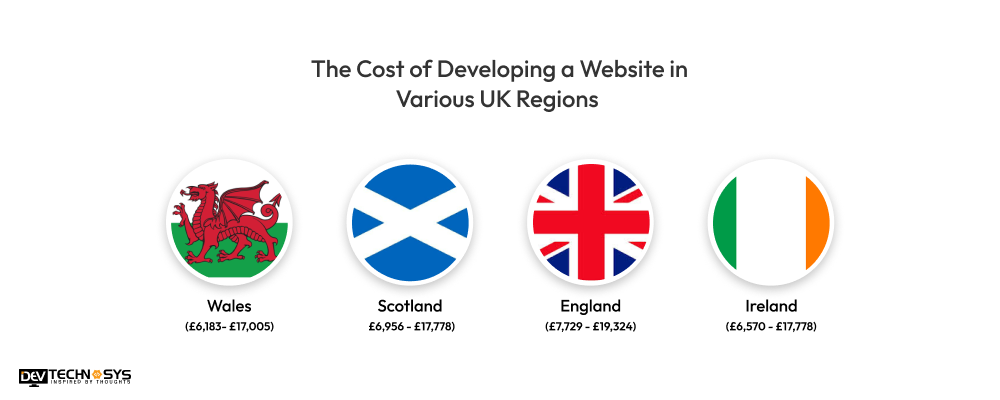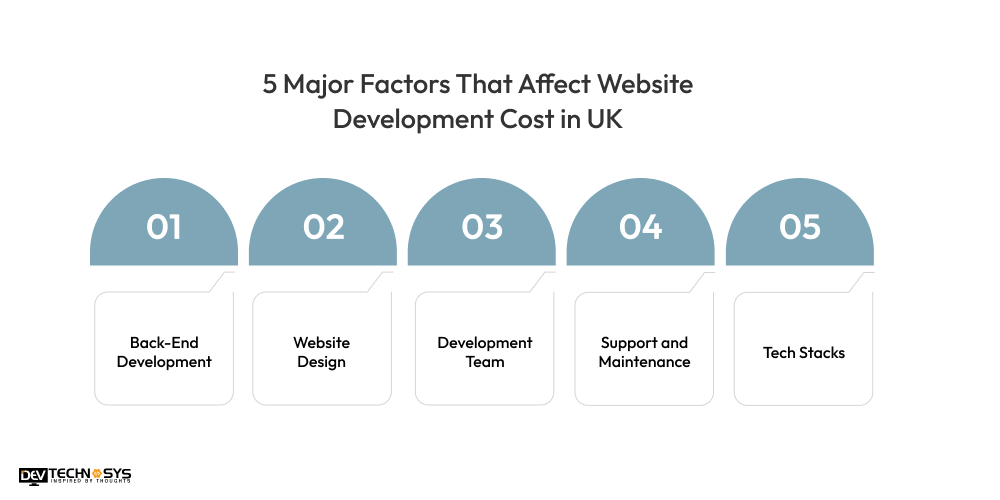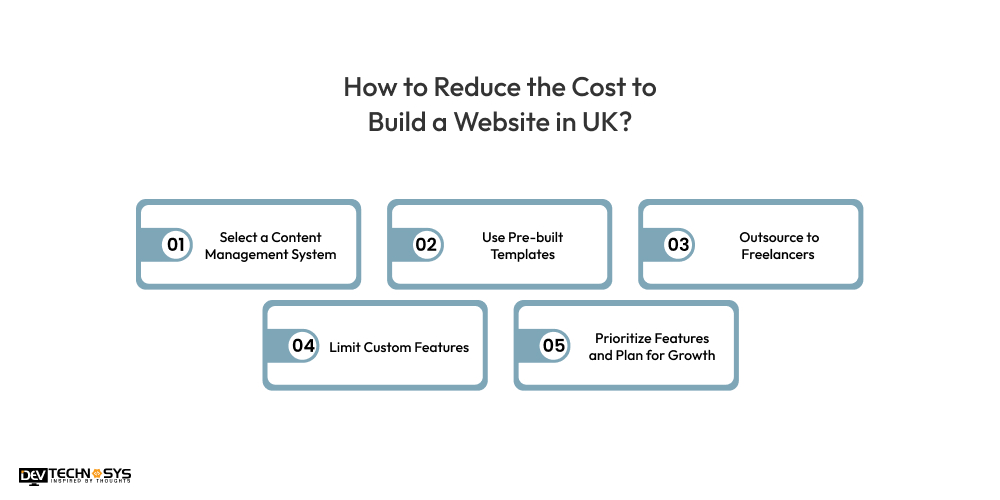In this digital era, every business in the UK wants to expand globally, but this can only happen through an online presence. This means they need to own a website to present their business to an audience and reach every corner of the world.
As per the global survey, the website development market was valued at around $70.6 billion in 2024. It is estimated to grow around $141.49 billion by the end of 2033.
This data shows how rapidly UK entrepreneurs are building websites to create bright faces in the digital world and reach new heights of success globally.
However, they do not have any idea about the website development cost. But do not need to worry about it.
Here, we provide the website development cost in UK, cost-affecting factors, website development cost in different UK regions, and more.
Let’s start!
What is Website Development Cost in UK?
Web development cost in UK can vary greatly based on the project’s complexity and scope. The average website development cost ranges from £6,183 to £10,048, with more complicated projects with unique features costing £19,324 or more. The type of website (e-commerce, portfolio, or blog), design needs, functionality, and developer experience all have an impact on cost.
Additionally, continuing maintenance, SEO services, and hosting might increase the entire cost. It is crucial to obtain a tailored price based on your individual demands.
Website Development Cost In UK
Website Complexity |
Cost Estimation |
| Simple Website | £6,183 – £10,048 |
| Mid-Premium Website | £10,821 – £15,459 |
| Premium Website | £19,324+ |
The Cost of Developing a Website in Various UK Regions
The cost to build a website in the UK’s different regions simply can be different from others. It helps businesses to choose website developers from different regions according to their budget and flexibility. So, here we provide the average cost of website development in UK’s different regions:

1. Website Development Cost in Wales
Website creation expenses in Wales are often lower than in larger cities in the UK, providing affordable solutions for small and medium-sized businesses. Major cities such as Cardiff and Swansea have talented developers who offer both basic and advanced website solutions. Because the market is smaller, overheads are reduced, leading to more competitive pricing.
Businesses with a strong pool of experienced developers can expect high-quality work without breaking the bank, particularly for basic websites or local projects.
Website Complexity |
Approximate Cost |
| Simple Website | £6,183 – £7,729 |
| Mid-Premium Website | £9,275 – £13,140 |
| Premium Website | £17,005+ |
2. Website Development Cost in Scotland
Scotland offers a well-balanced combination of cost and knowledge, especially in locations such as Edinburgh and Glasgow. While the costs are greater than in Wales, they are still competitive with London and the South of England.
Developers in Scotland are well-known for providing a wide range of services, from simple websites to complicated, feature-rich solutions. Scotland is an excellent choice for firms wishing to keep costs low while maintaining quality.
Website Complexity |
Approximate Cost |
| Simple Website | £6,956 – £9,275 |
| Mid-Premium Website | £9,275 – £13,913 |
| Premium Website | £17,778+ |
3. Website Development Cost in England
In England, website creation expenses vary substantially by area. London, as the capital, has the highest prices, with basic websites and sophisticated ventures. Prices in northern cities such as Manchester, Leeds, and Birmingham are more inexpensive, with websites at higher costs.
The South of England, which includes towns such as Bristol and Brighton, provides a midway ground between quality and price for firms looking for talented developers at competitive prices.
Website Complexity |
Approximate Cost |
| Simple Website | £7,729 – £10,048 |
| Mid-Premium Website | £10,821 – £15,459 |
| Premium Website | £19,324+ |
4. Website Development Cost in Northern Ireland
Northern Ireland stands out for having some of the most affordable website development costs in the UK. Cities such as Belfast have a thriving tech industry, allowing businesses to hire competent developers at far lower prices than in the mainland UK.
Northern Ireland is an appealing alternative for firms searching for cost-effective web development without sacrificing quality.
Website Complexity |
Approximate Cost |
| Simple Website | £6,570 – £7,729 |
| Mid-Premium Website | £9,662 – £13,526 |
| Premium Website | £17,778+ |
5 Major Factors That Affect Website Development Cost in UK
Website development costs in the UK are influenced by factors such as the complexity of back-end systems, custom application design, the expertise of the development team, the need for ongoing support and maintenance, and security measures. These elements impact both initial development and long-term operational costs.

1. Back-End Development
Back-end development involves creating the server-side functionality of a website, such as databases, user authentication, and API integrations. The complexity of these systems—like custom-built CMS, e-commerce platforms, or data handling—directly impacts the cost.
A simple website may only need minimal back-end work, while a feature-rich site requires advanced coding, increasing both time and website development costs UK.
Backend Development |
Cost Estimation |
| Basic Backend Process | £6,956 – £11,594 |
| Premium Backend Process | £12,367 – £16,232 |
2. Website Design
Website design refers to how the website or app looks and feels. It involves UI/UX design, ensuring the interface is visually appealing, user-friendly, and optimized for all devices. Custom designs, tailored specifically to a brand’s identity, cost more than template designs.
According to the website design development company, Intuitive navigation, mobile responsiveness, and smooth user flows all contribute to higher website design and development cost.
Design Quality |
Cost Estimation |
| Basic Design | £6,183 – £9,275 |
| Complex Design | £11,594 – £16232 |
3. Development Team
The size, skill level, and location of the development team influence the cost. Experienced developers, particularly in larger cities like London, typically charge higher rates.
You can hire Freelancers from a software development company to choose affordable options, but they could lack the specialized skills of larger agencies.
A diverse team of designers, developers, and project managers may be needed for more complex projects, increasing the cost of website development.
Developers Experience level |
United States |
United Kingdom |
Southeast Asia |
Eastern Europe |
| Junior-level | $15 – $25 | £14 – £24 | $12 – $22 | $10 – $20 |
| Mid-level | $30 – $50 | £27 – £44 | $25 – $35 | $25 – $33 |
| Senior-level | $60 – $80 | £50 – £65 | $40 – $55 | $40 – $50 |
4. Support and Maintenance
Websites require ongoing support for updates, security patches, bug fixes, and content management. Regular maintenance ensures that the website stays functional, secure, and up-to-date.
Depending on the complexity, some websites need frequent updates, while others may require only occasional checkups. Website development and maintenance costs can be charged monthly or annually, adding to the total cost of developing a website UK.
Maintenance Phase |
Cost Estimation |
| Simple Maintenance Phase | £1,545 – £3,091/year |
| Complex Maintenance Phase | £5,410 – £6,956/year |
5. Tech Stacks
The choice of tech stack (the technologies and tools used in development) influences both development time and cost. Modern frameworks like React or Angular can speed up development but require specific expertise, which can be more expensive.
Choosing open-source versus proprietary tools or building a custom solution all impacts the project’s overall budget and timeline.
Cloud Storage |
AWS, Microsoft Azure, Google Cloud | £772 – £2,318 |
Backend Development |
Django, PHP, Nodejs | £3,091 – £7,729 |
UI/UX Design |
Sketch, Adobe XD | £3,091 – £5,410 |
Payment Gateway |
PayPal, Stripe | £3,091 – £6,183 |
Security |
SSL, Biometric, Two-factor Authentication | £1,159 – £3,091 |
Project Management |
Jira, Trello, Asana | £772 – £2,705 |
How to Reduce the Cost to Build a Website in UK?
Reducing the cost of constructing a website in the UK requires a combination of strategic planning, sound technological choices, and resource optimization. Here are five practical techniques to reduce website construction costs:

1. Select a Content Management System
Using a content management system (CMS) such as WordPress, Shopify, or Wix can significantly reduce costs compared to custom-built websites. These platforms include user-friendly themes, pre-built features, and plugins that need little code.
You may maintain and update content without the need for a developer, which reduces ongoing maintenance expenses. The availability of free and premium themes also lowers design costs.
2. Use Pre-built Templates
Rather than spending in new designs, try adopting pre-designed templates that may be tailored to your business. Premium themes from platforms like as ThemeForest or TemplateMonster are an affordable option.
As we discussed earlier with mobile app development company, these templates offer a professional appearance and feel without the cost of custom design labor. With a few changes, you may still develop a one-of-a-kind site that meets your company’s requirements.
3. Outsource to Freelancers
Hiring freelancers or offshore development teams can be an effective approach to save labor expenditures. UK-based firms might be costly due to high overheads and premium hourly fees.
Working with distant freelancers or developers from low-cost countries (e.g., Eastern Europe, Asia) allows you to acquire qualified personnel at reduced rates while retaining quality.
4. Limit Custom Features
Custom-built features (such as complicated e-commerce systems or unique user interactions) can quickly drive up development expenses. Instead of starting from scratch, try using existing solutions or plug-ins.
For example, adopting pre-built payment gateways or stock management solutions on platforms such as Shopify or WooCommerce can save both time and money.
5. Prioritize Features and Plan for Growth
Begin with a Minimum Viable Product (MVP) methodology. Prioritize vital features first, then plan for future growth. Building a website with essential functionality (such as contact forms, a blog, and basic e-commerce) and gradually adding more advanced features as your company expands allows you to control expenditures. Avoid overloading your website with superfluous stuff from the beginning.
Conclusion
In this blog, we explored website development cost in UK, which widely depend on factors like design complexity, features, the expertise of the development team, and ongoing maintenance needs. By choosing cost-effective solutions, such as using CMS platform templates and limiting custom functionality, businesses can reduce expenses.
Planning for scalability and outsourcing development tasks can also help create a quality website while keeping costs manageable. If you want to know more about the cost to develop a website in UK, then you can connect with a web portal development company to offer affordable websites.
Frequently Asked Questions
Q1. How Much Does it Cost to Develop a Website in UK?
The cost to create a website in the UK ranges from £6,183 to £19,324+, depending on complexity, design, functionality, and the expertise of the development team, with ongoing maintenance adding extra costs.
Q2. How Long Does it Take to Build a Website in UK?
Building a website in the UK typically takes 3 to 6 months, depending on complexity. Simple sites may take 2-4 months, while more complex e-commerce or custom website development costs can take 7 months or more.
Q3. How Much Does Website Maintenance Cost in the UK?
Website maintenance in the UK typically costs between 15% and 20% of the initial website development cost, depending on the website’s complexity. Basic updates and security patches are on the lower end, while more complex updates increase the cost.
Q4. How Much Does it Cost to Hire a Web Developer in UK?
Hiring a web developer in the UK typically costs between £12 to £20 per hour, depending on experience, location, and project complexity. Freelancers generally charge less than full-service agencies or senior developers.







